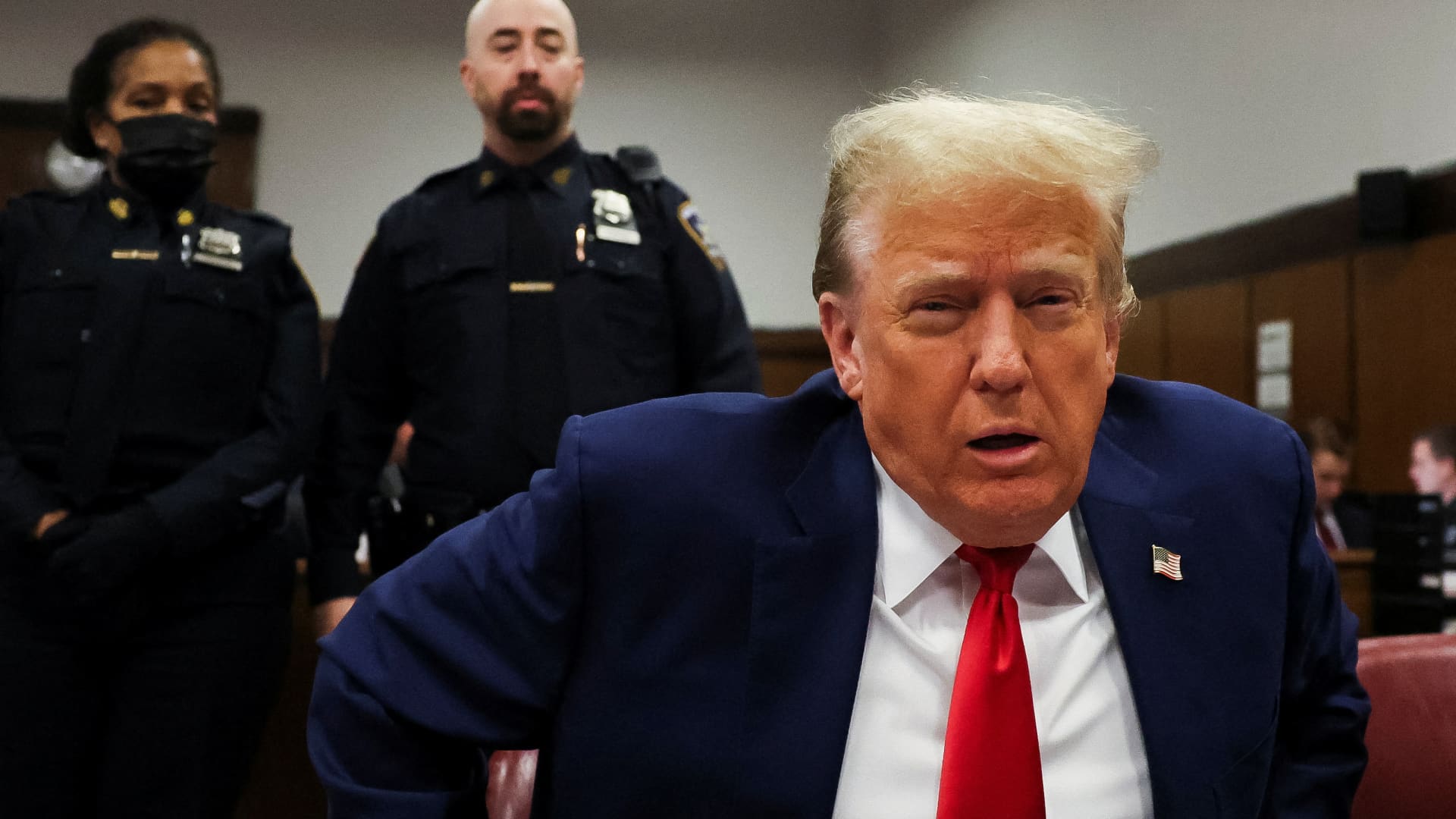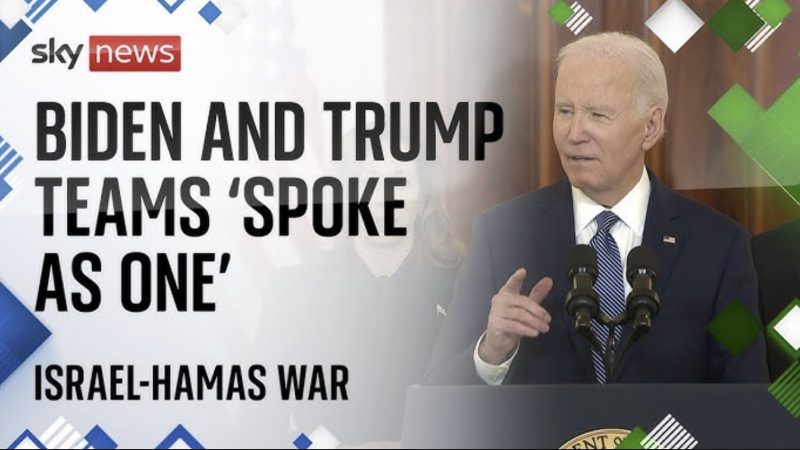Porn star hush money reimbursements were made pursuant to agreement with Trump sons

Republican presidential candidate and former U.S. President Donald Trump sits in the courtroom, as his criminal trial over charges that he falsified business records to conceal money paid to silence porn star Stormy Daniels in 2016 continues, at Manhattan state court in New York City, U.S., May 6, 2024.
Brendan Mcdermid | Reuters
This is developing news. Check back for updates throughout the day.
The Trump Organization’s reimbursement for a hush money payment to porn star Stormy Daniels was made pursuant to an agreement with Donald Trump’s adult sons, an email introduced as evidence in Trump’s criminal trial revealed Monday.
“Ok to pay as per agreement with Don and Eric,” read a February 2017 email from the company’s then-chief financial officer to controller Jeff McConney instructing him to reimburse Trump’s then-personal attorney Michael Cohen.
“They were running the company and they could approve any invoice they wanted,” McConney testified Monday, referring to Eric Trump and Donald Trump Jr., who took over day-to-day management of the Trump’s hotel and real estate company after their father was elected president in 2016.
On cross-examination, McConney told Trump’s attorney that he did not know what the reference to an agreement meant.
But the following witness, Deborah Tarasoff, explained that any invoices over $10,000 would have to be approved by either Trump or one of the two sons.
Cohen was paid a total of $420,000 in monthly installments of $35,000. Trump’s revocable trust paid $105,000 of the total reimbursement, and Trump’s personal account paid the remaining $315,000.
Tarasoff, an accounts payable supervisor who currently works at the Trump Organization, testified that “only Mr. Trump” could sign checks for the personal account.
Trump continued to sign checks for his personal account after he became president, Tarasoff said.
Eric Trump sat in the courtroom with his father in Manhattan Supreme Court while the elder Trump listened to the testimony, occasionally with his eyes closed.
Trump is charged with falsifying business records to hide the reimbursement to Cohen, who paid Daniels $130,000 shortly before the 2016 presidential election to bury her story of having a prior sexual tryst with Trump.
Manhattan District Attorney Alvin Bragg accuses Trump of concealing those records as part of an illegal scheme to influence the election.
The plan to pay Cohen
McConney’s testimony dove deep into the unusual circumstances surrounding Cohen’s reimbursement.
McConney said that the invoice was not sent to the company’s legal department, although it was typical for that department to review similar invoices for legal services.
Donald Trump Jr. and his brother Eric Trump arrive at New York Supreme Court for former President Donald Trump’s civil fraud trial on November 02, 2023 in New York City.Â
David Dee Delgado | Getty Images
McConney testified about the plan to repay Cohen by paying him $130,000 for the payment to Daniels, plus $50,000 to pay a company called Red Finch for tech services.
Weisselberg wrote that the reimbursement should be “grossed up” to $360,000 to cover Cohen’s taxes. They added another $60,000 as a bonus to Cohen, for a total of $420,000, according to the trial exhibits and McConney’s testimony.
McConney said he could not think of another instance where an expense reimbursement was doubled to account for tax payments.
He also testified that he never saw a retainer agreement with Cohen related to those payments. That’s significant because Bragg alleges Trump falsified the Cohen reimbursement records by recording them as payments for legal services rendered in 2017 through a retainer agreement.
Trump held in contempt again
The dive into the Trump Organization’s finances came after Judge Juan Merchan kicked off the trial day with a dire warning to Trump: Stop violating the court’s orders, or you will be thrown in jail.
“The last thing I want to do is to put you in jail. You are the former president of the United States, and possibly the next president as well,” Judge Juan Merchan told Trump in Manhattan Supreme Court, where the former president is on trial in a criminal hush money case.
“I do not want to propose a jail sanction,” Merchan said, but “that I will, if necessary.”
The ultimatum came less than a week after the judge held Trump in contempt of court for nine violations of his gag order, which bars him from speaking about witnesses, jurors and other parties involved in the trial.
On Monday morning, Merchan held Trump in contempt again for claiming in an April 22 radio interview that the trial was “very unfair” because the jury was picked from an area that is “mostly all Democrat.”
In making that claim, Trump “not only called into question the integrity, and therefore the legitimacy of these proceedings, but again raised the specter of fear for the safety of the jurors and of their loved ones,” Merchan wrote in his ruling.
Merchan gave Trump the maximum fine of $1,000 for the latest gag order violation, giving him a total of $10,000 in fines for 10 separate infringements.
Trump is also “hereby put on notice that if appropriate and warranted, future violations of its lawful orders will be punishable by incarceration,” Merchan ruled.
The judge acknowledged before handing down his ruling that, “It appears that the $1,000 fines are not serving as a deterrent.”
But he said he would not hastily take the drastic step of throwing Trump in jail for his continued contempt.
“The magnitude of such a decision is not lost on me,” Merchan said.
“There are many reasons why incarceration is truly a last resort for you,” he said. “To take that step would be disruptive to the proceedings.”
“But at the end of the day, I have a job to do.”
Courtroom drama
The tense start to the fourth week of the historic trial followed a series of other dramatic developments, including a breakdown on the witness stand by a former top White House aide.
Jeffrey McConney, controller for the Trump Organization, leaves New York State Supreme Court in New York, US, on Friday, Oct. 6, 2023.Â
Michael Nagle | Bloomberg | Getty Images
On Friday, former longtime Trump aide Hope Hicks testified for the prosecution under subpoena. She provided an insider’s account of how Trump and his team reacted to damaging news about him on the 2016 presidential campaign trail. This included the infamous “Access Hollywood” tape, in which Trump was caught on tape bragging about sexual misconduct.
“Everyone was just absorbing the shock of it,” Hicks said as she described how she broke the news to the campaign.
That tape renewed media interest in Daniels’ little-known account of a sexual encounter she said she had with Trump in 2006, according to a lawyer who helped broker the $130,000 hush money payment.
Former White House communications director Hope Hicks leaves the hearing room during a break at a closed-door interview with the House Judiciary Committee June 19, 2019 on Capitol Hill in Washington, DC.Â
Alex Wong | Getty Images News | Getty Images
Hicks testified that while she was working in the Trump White House, Trump told her that Cohen had made the payment without Trump’s knowledge in order to protect him, and that he did it “out of the kindness of his own heart.”
Hicks said she thought acting out of pure kindness would be “out of character for Michael.”
She also suggested that Trump was pleased the Daniels story did not come out before the election. “I think Mr. Trump’s opinion was it was better to be dealing with it now, and that it would have been bad to have that story come out before the election,” she testified.
When Trump’s attorneys began their cross-examination, asking her basic questions about her time at the Trump Organization, Hicks quickly broke down in tears on the witness stand.
Read the original article here






